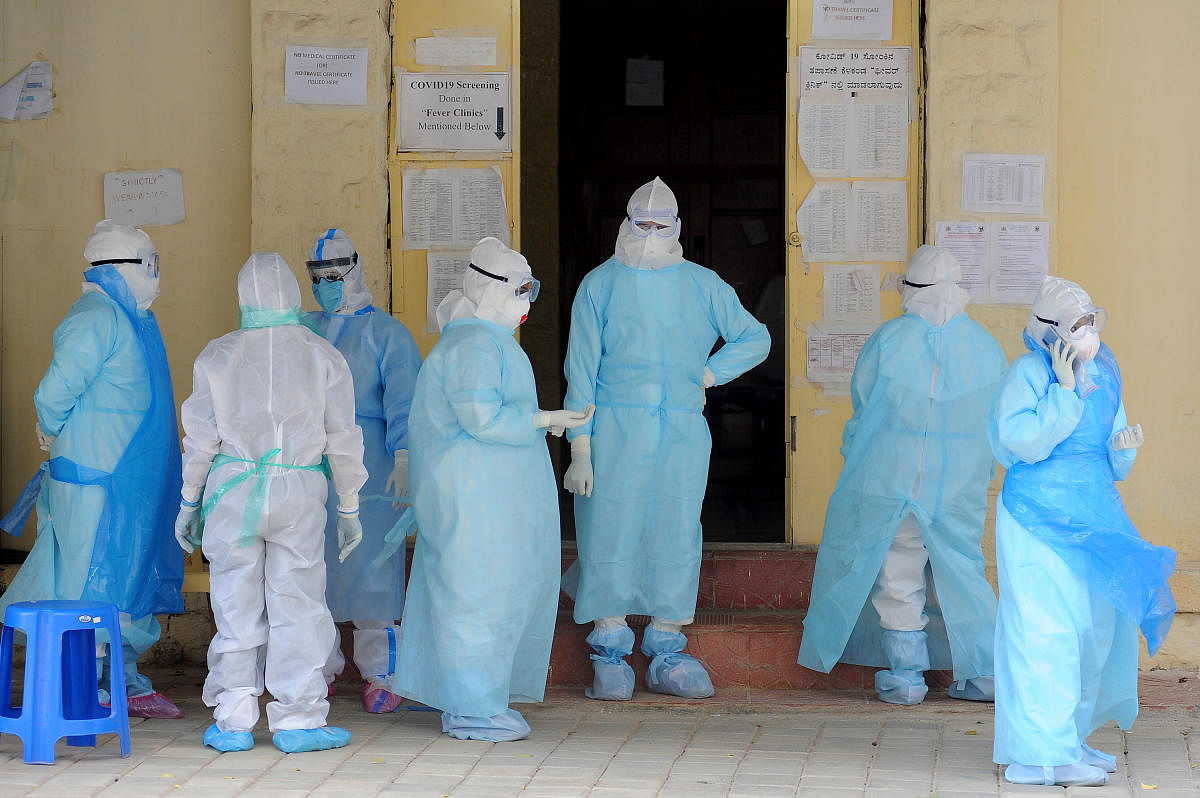
The Karnataka government has come under fire for buying PPE kits at inflated prices.
Metrolife spoke to buyers and traders, and found wide variations in pricing.
The kits offer little by way of manufacturer description to determine quality and authenticity. Stores are quoting, and getting, their own prices.
Saqib Idrees, founder of Bengaluru for migrant workers, is raising funds to get PPE kits for the staff of smaller hospitals.
He spent a week researching quality and prices to get the best possible quotes. “The thickness of a good PPE kit is around 95 GSM but most kits in the market are of 30 to 40 GSM, so to get to the right kit takes a good amount of searching,” he says.
Price is the next problem. He had bought a 30 GSM kit in the early stages of the pandemic and it set him back by about Rs 2,000. Now this sells for just Rs 100, he says.
Rajeev Krishna, founder of aTechTron, a government supplier of the kits says that this fluctuation can be explained by the changing demand and supply. “In pre-covid times the cost of a Grade A kit with all the trims was around Rs 800. During the lockdown the demand was higher and supply was low, there was difficulty in procuring material, all of which drove up the prices to around Rs 1,500. But now it’s stabilised and prices are back to pre-covid times,” he says.
aTechTron’s 90 GSM kits were priced at around Rs 1,000 during the lockdown. They have come down to Rs 650.
Depending on the contents of the kit and the quality the price can go as low as Rs 180. “Different quality kits have different uses, highest grease kits are for doctors who are directly treating these patients and lower quality ones may be used by those who are not in contact with them, this greatly affects pricing,” says Vijay Kumar, a PPE supplier.
Meanwhile, pricing is not as ideal as expected. A supplier from Fraser Town quoted Rs 1,000 for a single personal use kit and Rs 750 for more than 100 kits.
PPE prices are confusing, Saqib found, especially as a layperson doesn’t understand the technicalities of quality. “People are taking Rs 1,000 for a kit from those attending funerals. I understand selling anything at a margin, but profiteering off a tragedy is not right,” he says.
On the contrary Rajeev says that many manufacturers are now left selling at lower than cost price due to the demand-supply fluctuation.
Mohamed Irfan, volunteer with Mercy Mission, agrees with Saqib. The NGO recently began a drive to help medical workers with equipment.
“The lack of any government regulation and certification has made it difficult to know where to buy from,” he says. He has found prices ranging from Rs 300 to Rs 3,000. Mercy Mission is sourcing kits at between Rs 400 and Rs 600. “It’s not just price and quality that’s not regulated, it’s also the contents of the kit. In a kit, some suppliers provide two pairs of gloves, masks and shoe covers, while others provide just one,” he explains.
Quantity also determines pricing. Larger purchases always mean lower prices, and Irfan suggests governments and medical associations order in bulk and open kiosks across the city to help those who need kits.
“This would ensure good quality and best rates,” he says. “And people will know where to buy.”
Doctor says
Dr Ramesh K N, associate professor of medicine, nodal officer for Covid-19, Bowring and Lady Curzon Hospital says that government hospitals are now well-stocked with good quality PPEs. “We had a few issues earlier since there were some problems with Chinese goods, but now it’s all good,” he says.
‘Most important’
The WHO describes Personal Protective Equipment (PPE) as ‘most important’ in preventing transmission of viruses.
PPE kits consist of garments and accessories to protect health care workers and others at risk of infection. PPE kits come in two varieties: for single use and multiple use. They usually consist of goggles and mask or face shield, gloves, gown or coverall, head cover, and rubber boots.
How did price double
in a week?
According to a letter from the Karnataka State Drugs Logistics and Warehousing Society to the health and family welfare department, the prices of PPE kits procured for the state vary greatly. These purchases were made in March and April.
The first two purchases are from Plasti Surge Industries, Amravati. The first is an order for 1.5 lakh kits at Rs 330.40 a unit. The second is for one lakh kits at Rs 725 a unit. The orders were made five days apart during which the price more than doubled for the same product. These kits had come under fire for being of substandard quality.
The largest and most expensive order was given to China-based DHB Global for two lakh PPE kits at Rs 2,177 a unit. The prices are exclusive of shipping, GST and customs clearance. The government is now said to be largely buying kits at a price of Rs 650 per unit.
‘Corruption during a pandemic is inhuman’
Engineer-turned-politician Ravikrishna Reddy is among those seeking an inquiry into PPE purchases at inflated prices.
“The government has procured substandard PPEs from website design companies and agro-instrument companies,” he says. He says stipulations for such gear are in place but they are being diluted in the name of the pandemic.
“Before the pandemic, the kits being procured were top-notch. Now doctors say they are more like mosquito nets,” he says. Politicians from across parties are to blame for the state of affairs, but the current government has ‘blood on its hands’ for corruption at a time of such distress, he says.